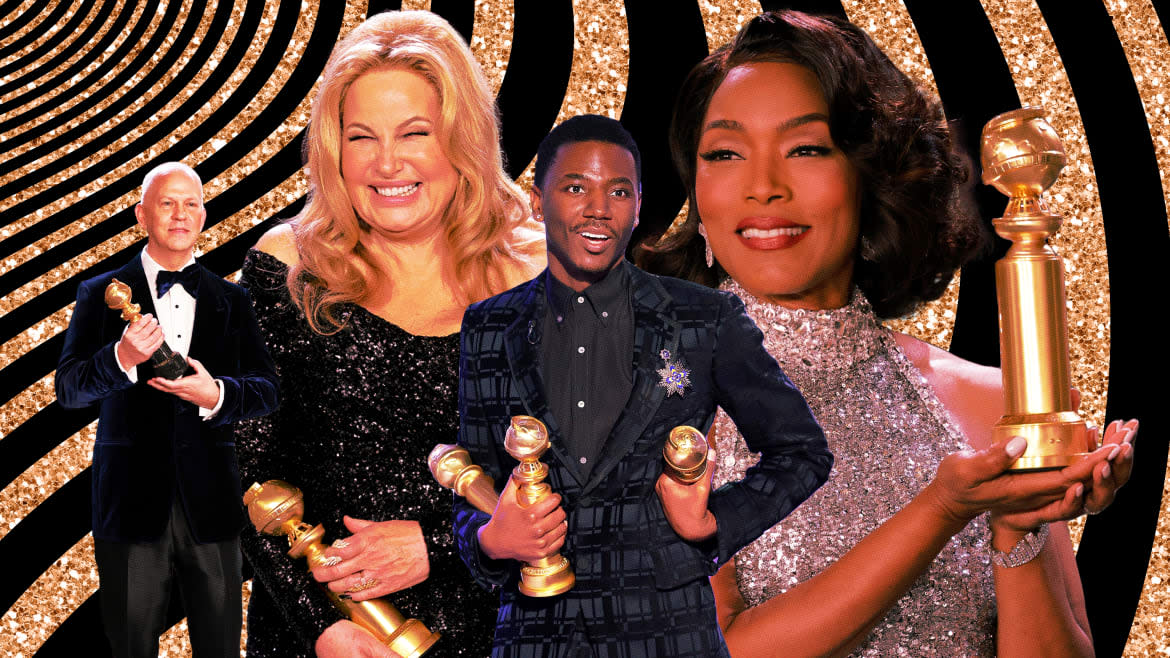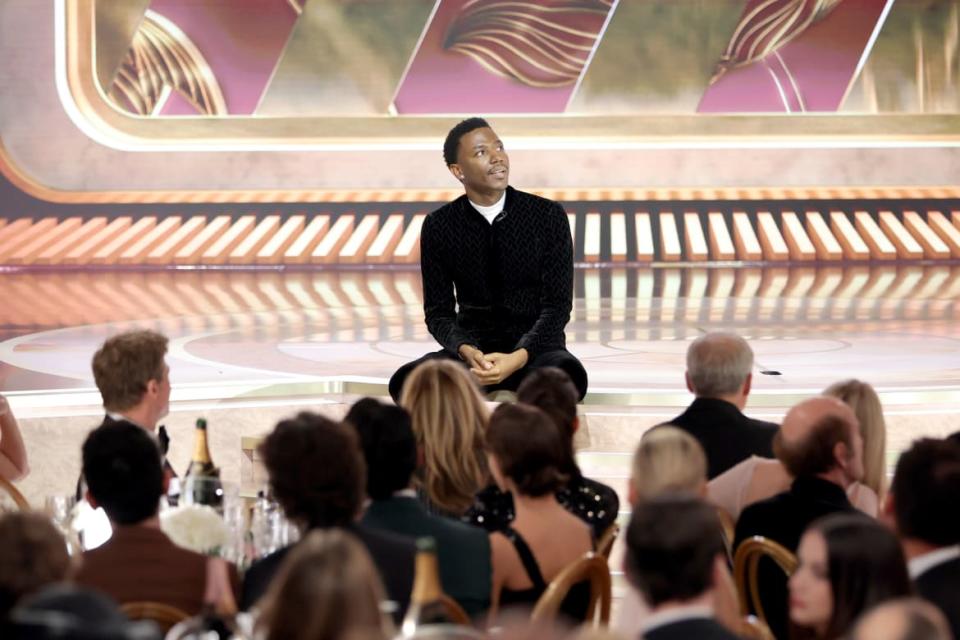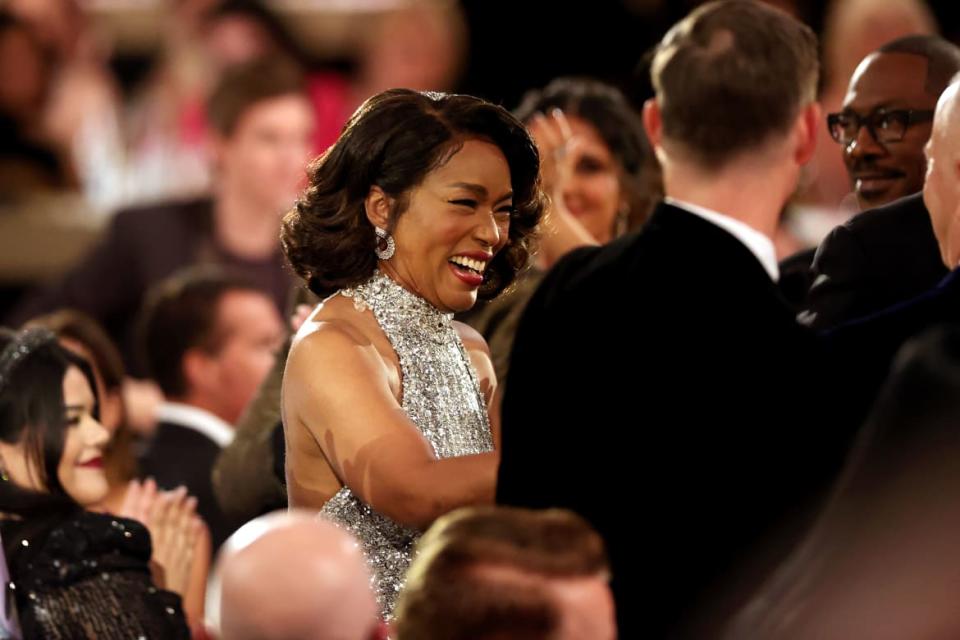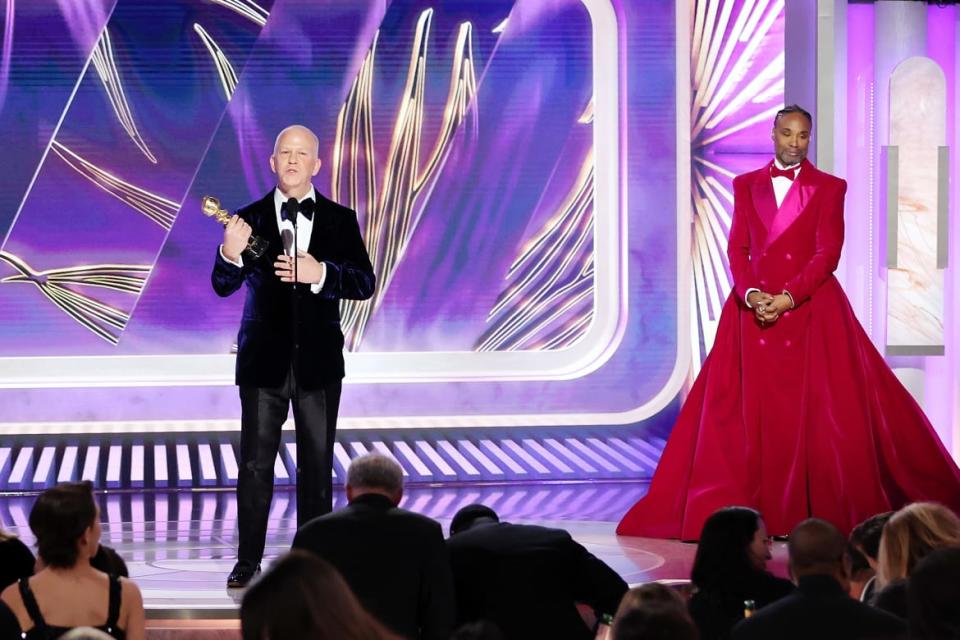The Golden Globes Telecast Was Chaotic in the Ugliest, Weirdest Way

- Oops!Something went wrong.Please try again later.
- Oops!Something went wrong.Please try again later.
If you took a shot every time you thought, “What the hell is going on?” while watching Tuesday night’s Golden Globe Awards you’d be… well, maybe half as inebriated as the people in the room seemed to be. (Bless The White Lotus creator Mike White, who accepted his Best Limited Series trophy while saying, “I was gonna give this speech in Italian, but I’m too drunk.”)
For decades, chaos has been the Golden Globes’ brand. Their nominees and winners were quirky, or at least extremely famous people and populist choices that the Academy Awards and snootier organizations would scoff at. The ceremonies were boozed-up parties. Celebs gave silly, meandering speeches. Ricky Gervais would say something smug and obnoxious! Jack Nicholson would be sitting in the front row, grinning and wearing sunglasses! What a hoot!
That chaos bred scandal. The Hollywood Foreign Press Association, the organization behind the Globes, has a sordid history of bribery and favoring the projects and talent that gave them swanky access. A scathing investigation in 2021 by the Los Angeles Times revealed that the HFPA had no Black voting members, an uproar over which led to the cancelation of 2022’s ceremony, a Hollywood boycott of the organization, and a call for major reform, diversity, and proof of legitimacy.
The HFPA did… some of that. And, gauging by Tuesday night’s star-studded event, most were happy to swallow their hypocrisy for the opportunity to wear fancy dresses on the red carpet, be told they’re great at acting, and engage in Hollywood’s favorite pastime: pretending that none of this ever happened.
Golden Globes 2023 Winners: Who Won and Who Should Have?
So the first “what the hell is going on?” of the night would be the disbelief that this was happening at all—that everything that was said in these last years about accountability and responsibility went out the window because parties sound really fun again.
There was some question when NBC announced the show would be returning—albeit on a decidedly unglamorous Tuesday—about whether the talent would take a stand on principle and not show up. Despite what my elementary school teachers always said, it turns out there is such a thing as a stupid question.
They all did, with shockingly few exceptions. And those who skipped out left confoundingly detailed statements about why, with no mention of “umm… it feels gross to be there.” (Amanda Seyfried was “deep in the process of creating a new musical this week”—???—while Kevin Costner was sheltering in place from the rain in Santa Barbara, which God’s gift to us all, Regina Hall, gloriously roasted.)
So then came this new form of chaos, the specific kind of chaos that defined this year’s Golden Globes, and in a really unpleasant way.

Pictured: Host Jerrod Carmichael
Comedian Jerrod Carmichael’s take-no-prisoners, we’re-gonna-talk-about-this hosting clashed violently with the crowd’s palpable, desperate desire to just have a good time and not think about icky things, like their own morally contradictory nature.
There were all-time great speeches from the likes of Jennifer Coolidge, Michelle Yeoh, Angela Bassett, Ryan Murphy, and Steven Spielberg. And there was an insistence partway through the telecast to start playing the winners off almost immediately that spawned a Twitter backlash against the show’s pianist, Chloe Flower. The vitriol was so intense that Carmichael had to address the actors, who had been crudely sniping at her to “shut up” during their speeches, and the viewers at home, asking them to cool it.
The aggressive tenor was, truly, confusing. Just about as confusing as an awards show that’s known for fawning over celebrities, and which made grand overtures over the last year to court them back to its ceremony, only to cut them off when they’re doing the thing that’s the whole point of the endeavor: accepting their awards. (Yet another “what the hell is going on?” Take a drink!)

Angela Bassett reacts after winning the Best Supporting Actress in a Motion Picture
This, of all Golden Globes ceremonies—of all award shows, period—needed to be edgy. Carmichael understood the assignment. There was no option to not discuss the controversy, though the HFPA likely would have preferred it go unspoken. Carmichael needed to be ruthless, and he was. “I’m here because I’m Black,” he began, before delving into his thought process behind accepting what was a glaring damage-control host offer.
“I wouldn’t say they were a racist organization, but they didn’t have a single Black member until George Floyd died. So do with that information what you will,” he said during his monologue. “One minute you’re making mint tea at home. The next minute you’re invited to be the Black face of an embattled white organization. Life comes at you fast.”
I’ve never seen a room of people so afraid to laugh. It was a smattering of giggles. A lot of clenched jaws, wide eyes, and red faces, and so much nervous inhaling you could almost hear it through the screen.
Jerrod Carmichael Makes Celebs Deeply Uncomfortable in Globes Monologue
One thought was that the publicists told them not to laugh at these jokes. (You know, part of that “don’t acknowledge the bad thing that happened” oath that celebrities take when they get their SAG cards.) Or maybe they were deeply uncomfortable. It was too much truth-telling. Remember, this is Hollywood! Such things don’t happen there.
As the monologue went on, you could feel some of them wonder if they should be embarrassed to be there. (The answer: Yes!)
But then it was time for another round of “what the hell is happening?” drinks to be ordered, because the show moved on from Carmichael’s controversial monologue with astonishing speed. And the things it moved on to were quite lovely.
Ke Huy Quan won Best Supporting Actor for Everything Everywhere All at Once, 40 years after his child-star debut in Indiana Jones and the Temple of Doom, and after decades of wondering if such success would ever happen to him again. Bassett won Best Supporting Actress, 28 years after collecting her first trophy for What’s Love Got to Do With It?—the first performer from a Marvel film to win a major acting award. They both delivered emotional speeches that proved why awards shows, these wins, and the opportunity and visibility they give matter.
Ke Huy Quan gets emotional as he accepts his #GoldenGlobe. https://t.co/IpBnF0ZqEp pic.twitter.com/i1dj81Ns6c
— Variety (@Variety) January 11, 2023
It set up a whiplash match of tonal ping pong that one human neck couldn’t possibly keep up without snapping.
Carmichael, to his credit, never relented with his jokes throughout the night, even though the audience proved unfriendly to how provocative they were. (In another year, with no scandal on the mind and someone like Gervais hosting, one wonders if the crowd would be inconsolable with astonished laughter.)
He joked about Tom Cruise and allegedly missing Scientologist Shelly Miscavige. (Silence, then gasps.) He quipped, “While we were at the commercial, we actually awarded Will Smith with the Rock Hudson Award for best portrayal of masculinity on television.” (The audience was still gabbing too loudly from the commercial break to even hear him.) He joked to Spielberg that he watched The Fabelmans with Kanye West and it “changed his mind.” (Spielberg immediately started guffawing, so everyone else finally felt safe to do the same.)
A skewering of the Globes, given the scandal of the last few years, is what the viewership wanted to see. The irritation in the room that it was happening gave off a noxious energy that the show couldn’t overcome, even as it churned out a series of meaningful moments.
Jennifer Coolidge’s speech was perfect:
“I had such big dreams as a young person, but what happens is they get sort of fizzled by life. Mike White, you gave me a new beginning, even though this is the end, 'cause you did kill me off. Even if this is the end, you changed my life” pic.twitter.com/pHNPAhhQpj— Spencer Althouse (@SpencerAlthouse) January 11, 2023
The HFPA is known, again, for wacky winners, but this year, perhaps in its bid for legitimacy and respect, its picks were largely great. There were some very “Globes gonna Globe” choices, like Costner winning for Yellowstone, or House of the Dragon winning Best Drama Series. But the choices were overwhelmingly… nice. And the speeches were exceptional.
Murphy used his time as the winner of the Carol Burnett Award for lifetime achievement in television to spotlight the LGBT performers from his hit shows that were the brave faces of the sometimes difficult change the projects helped spur: Pose’s Mj Rodriguez and Billy Porter, Dahmer’s Niecy Nash, The Normal Heart’s Matt Bomer, and Hollywood’s Jeremy Pope.
“It’s hard being a LGBTQ kid in America,” he said. “In fact, all over the world. You’re often told you’ll never become anything, you have to hide your light to survive. But for those kids watching, I offer up MJ, Billy, Niecy, Matt, and Jeremy as examples of possibilities.”

Ryan Murphy accepts the Carol Burnett Award from Billy Porter
My God, what a beautiful message. I’m so glad that there was a major awards show to air it—a catalyst for more conflicted feelings about the Globes and whether this year’s ceremony should exist.
When Spielberg won for directing The Fabelmans, which also won Best Drama, he said, “Nobody really knows who we are until we’re courageous enough to tell everyone who we are.” In other words, the speeches were so good! If you don’t think I’m refreshing the Globes’ YouTube page all night for my chance to watch Coolidge, White, or Quinta Brunson’s beautiful ones again, you’re sorely mistaken.
That’s the chaos here: an identity crisis.
It’s a Golden Globes identity crisis, sure; what was once the goofy, meaningless Hollywood party is now choosing so many deserved, expected winners that it teeters on boring. And a show that used to be beloved by the industry for its grit and ballsiness is playing to crickets for acknowledging the current harsh truth: everyone’s complicit in its dark past.
Celebs vs. the Golden Globes Pianist Is Hollywood’s New Biggest Feud
But maybe it’s more of a Hollywood identity crisis, then—one that it doesn’t want to be dealing with. At tumultuous times like—look around, folks—the one we’re in now, chaos should be embraced. Through it comes clarity, purpose, and, maybe eventually, change. There’s an obvious understanding of that; those speeches abounded with versions of that message. But there’s a hesitation to embrace it fully, to pursue only the meaningful progress that you’re comfortable with exposing.
It’s a remarkable thing after all this time to watch the Golden Globes, think “what the hell was that,” and have it not be a good thing. But, hey, if you’ve thrown back a shot every time we said that like we advised, at least you’re calling on that classic Globes spirit: We’re all going to be drunk.
Keep obsessing! Sign up for the Daily Beast’s Obsessed newsletter and follow us on Facebook, Twitter, Instagram and TikTok.
Get the Daily Beast's biggest scoops and scandals delivered right to your inbox. Sign up now.
Stay informed and gain unlimited access to the Daily Beast's unmatched reporting. Subscribe now.

